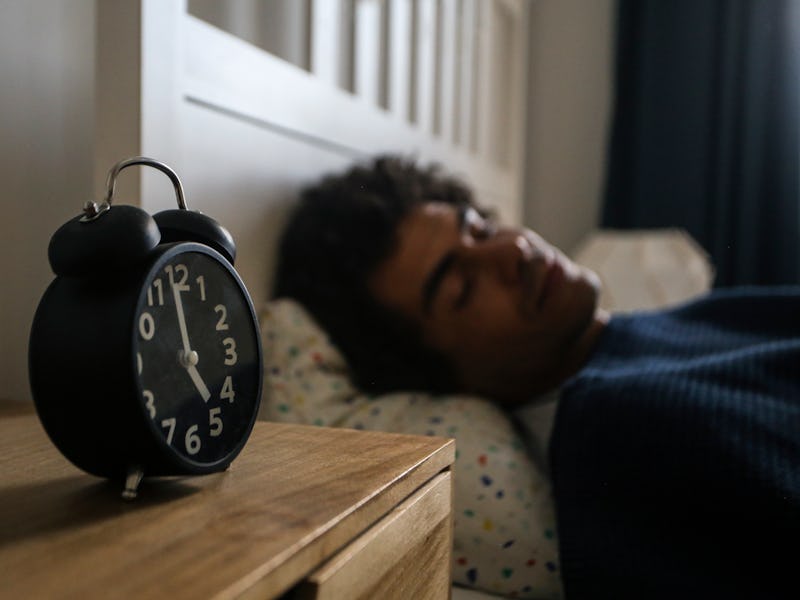New Study Suggests “Hibernating” During the Winter Might Be Good For Your Health
Why you should live more like a bear.

We have a complicated relationship with our alarm clocks. On the one hand, we rely on these gadgets — whether they be on our cell phones, staticky radios, or projections floating above our beds — to make sure we’re not racing to catch the train to work. But on the other hand, there’s that wretched snooze bar and its annoying beep jarring you out of many a pleasant dream.
Wouldn’t it be nice to sleep in, to forgo the sunrise pummeling and smashing of your poor alarm clock? Depending on the season, you might actually have the perfect scientific excuse.
In a study published last week in the journal Frontiers in Neuroscience, researchers in Germany found that people were naturally racking up an extra hour of sleep during the winter nights compared to summer nights. These longer hours in bed also included 30 extra minutes of rapid eye movement (REM) sleep, a stage of deep sleep crucial to forming long-term memories, regulating emotions, and developing and restoring the brain.
How the seasons influence our sleep-wake cycle
Our species’ sleep deprivation is nothing new. According to a 2020 survey conducted by the American Academy of Sleep Medicine, 34 percent of American adults reported sleeping more in the winter, and more than 36 percent said they sleep less in the summer.
A large part of that is because during the winter, we experience fewer hours of ambient sunlight, which drives our circadian rhythms (aka our biological clock), and the chemicals like melatonin that signal to our body that it’s time to sleep (aka sleep-wake cycle), Rafael Pelayo, a clinical professor of psychiatry and behavioral sciences at Stanford University School of Medicine, who was not involved in the study, tells Inverse.
But it doesn’t necessarily have to be natural sunlight. Studies have shown that artificial light exposure, like indoor lighting and electronic devices, can disrupt our circadian rhythms by suppressing melatonin and leading to a whole gamut of conditions like depression, obesity, diabetes, and cardiovascular disease.
Since we literally hold the power of light in our palms — purposefully manipulating our circadian rhythms, for better or worse — it’s not entirely clear how the long-term effects of seasonality have played out in our sleep. This is what Kunz and his colleagues set out to investigate in their new study.
How winter affects our sleep
For all of 2019, the researchers monitored the sleep of over 180 participants. The participants were 90 men and 98 women, all of whom lived in Berlin and reported sleep-related difficulties but weren’t on any sleep medications. These individuals had undergone sleep studies called polysomnography before participating in the study.
The setup was they would spend three nights in the sleep lab each month and were encouraged to sleep when and how they usually did at home, albeit without an alarm clock. While they slept, the participants were hooked up to sensors measuring their brain waves, blood oxygen levels, heart rate, breathing, and eye and leg movements (all part of a polysomnograph).
As autumn bled into winter, spring, then summer, Kunz and his colleagues noticed that their study subjects had distinct sleeping habits as the seasons changed. In the winter, they slept an hour extra (although, importantly, this result barely missed being statistically significant), and in the autumn, compared to spring, they entered REM sleep much quicker by about 25 minutes. In the winter months, they also experienced 30 more minutes of REM sleep on average compared to the spring. In the fall, the participants had a swift and sudden drop in slow-wave sleep, a stage of non-REM sleep that occurs in the first half of the night and is thought to be important for memory, growth, and immune function.
The takeaway: Let the seasons guide your sleep
Kunz cautions that the study’s findings are based on a small group of individuals with sleep issues and need to be replicated in a large cohort of healthy subjects. But this finding and studies like it, Pelayo says, cement the need to define sleep not by a rigid when you should go to bed or wake up but by changing seasons, allowing ourselves to take advantage of the shorter daylight days to sleep in.
“Some people get caught up in the timing issue and lose weight of the overall issue, which is total sleep time,” he says. “People with sleep issues do the most logical thing, which is waking up depending on what time [they] fell asleep. That makes sense [but] it’s completely wrong, and that’s because… of the seasonality.”
This seasonal approach to sleep would require societies and work infrastructures to adjust their hours around changing sleep needs, which Pelayo says can be crucial for age groups like children who need an adequate slumber for healthy brain and bone development. Action somewhat in that direction is happening. For instance, last year, California passed legislation delaying school start times, with middle and high schools starting no earlier than 8 AM and 8:30 AM, respectively; other states like Florida, New York, and New Jersey are considering similar legislation.
So, all in all, if you’ve been wanting to sleep more this winter, if you are able, don’t set an alarm.
This article was originally published on